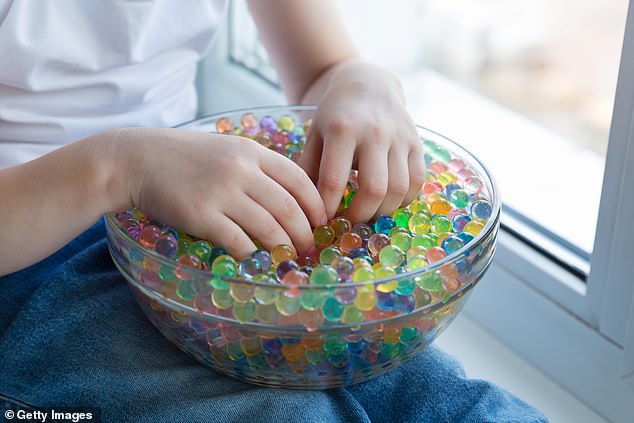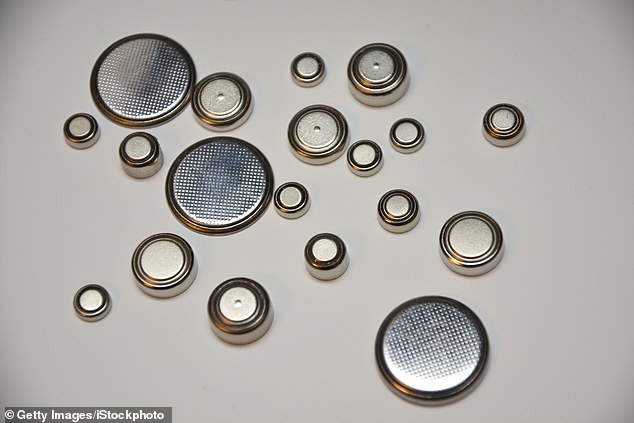The toys you should NEVER gift to children for Christmas because of the risk of choking, injuring or hacking, according to ER doctors
Pediatricians are warning parents this holiday season about gifts for children that can cause choking, burns and intestinal damage.
According to the U.S. Consumer Product Safety Commission (CPSC), toy-related injuries accounted for more than 145,000 emergency room visits in children 12 and younger in 2022.
And the holidays can be the highlight. Dr. Michael Flaherty, a pediatrician in the intensive care unit at Mass General for Children Hospital in Boston, told DailyMail.com that there is a “huge increase” in these incidents during the holidays.
“I would say December and January are probably the top two months for toy-related injuries in the United States,” he said.
According to the U.S. Consumer Product Safety Commission (CPSC), toy-related injuries accounted for more than 145,000 emergency room visits in children 12 and younger in 2022.
For example, battery-powered gadgets such as racing cars and dolls can cause burns to the throat and stomach lining if the coin-shaped batteries are swallowed.
Gun toys such as Nerf guns can hit children in the eyes, causing pain, blindness and even eye loss.
And Dr Flaherty named water beads as the most dangerous toy for children this Christmas because they can grow up to 400 times their size and cause choking and intestinal blockages.
Here are the toy pediatricians warning parents to avoid this holiday season.
Water beads

Water beads are marketed as children's toys or therapies for children with sensory processing disorders or autism spectrum disorders
Water beads are typically used for sensory play and developing fine motor skills in children with developmental delays, such as autism spectrum disorder.
They are also used as liquid absorbers in baby diapers, incontinence garments and sanitary napkins.
When wet, they can expand up to 400 times their size. Dr. Flaherty said if these are swallowed, they can be difficult to remove.
“We're seeing a lot of injuries related to these water beads,” he said. 'If a child receives such a bead, swallows it and it gets into the airways, it starts to expand as soon as it becomes moist or wet with saliva.'
“It could really pose a huge risk.”
If they get stuck in the airways, the beads can pose a choking risk. Even if they get further, they can cause blockages.
Dr. Flaherty said children under three years old are particularly prone to swallowing them because they are small, colorful and almost look like candy.
In March, the CPSC and toy company Buffalo Games recalled more than 50,000 “Chuckle & Roar Ultimate Water Beads Activity Kits” sold at Target after one baby was injured and another died.
The injured child, Kennedy Mitchell of Maine, was hospitalized after swallowing one of the beads. She developed an intestinal blockage, which can be fatal because it cuts off the blood supply to part of the intestines.
The 10-month-old baby went into septic shock and had to be put on a ventilator. She eventually recovered.
Weapon toy

Nerf gun pellets can damage the retina, a layer of tissue at the back of the eyeball, which can lead to blindness or blurred vision
Nerf guns have been a holiday favorite since they first emerged in the 1980s.
Although the foam bullets may seem harmless, they shoot so quickly that the impact can damage the eyes and other parts of the body.
In 2018, a nine-year-old boy in Wales lost one eye after a friend shot him with a Nerf gun bullet. Six years earlier he had gone blind in that eye when he was hit by a toy arrow.
The pellets have also been shown to damage the retina, a layer of tissue at the back of the eyeball, which can lead to blindness or blurred vision.
“Nerf guns and rocket launchers and anything that could be a projectile that could damage or hurt someone's eye or potentially cause damage at high speeds, I generally try to advise parents to avoid that,” Dr. Flaherty said.
Toys with button batteries or magnets

Children's Hospital of Philadelphia estimates that button batteries are swallowed more than 3,500 times a year
Many toys are powered by batteries.
Race cars, baby dolls and even some yo-yos contain button batteries. These are also called button cell batteries because they are about the size of a coin.
Button batteries are made with lithium-ion. When swallowed, saliva produces an electrical current that leads to chemical reactions.
This can lead to severe burns in the esophagus, which connects the throat to the stomach. These burns can perforate the esophagus, paralyze the vocal cords and damage blood vessels.
“They can do really terrible damage to the esophagus and stomach,” Dr. Flaherty said.
Children's Hospital of Philadelphia estimates that button batteries are swallowed more than 3,500 times a year. According to the CPSC, 70 children have died from these injuries.
Dr. Flaherty also warned against toys with magnets, many of which are sold as sets, which could cause children to swallow more than one. 'These magnets are so strong that pieces of intestine can actually stick together and cause perforations or holes in the intestine.'
“These could be surgical emergencies.”
Tablets with WiFi

Dr. Flaherty recommended avoiding Wi-Fi-enabled devices because they could steal privacy information from children
Tablets have become a common gift for children to play games and watch sensory videos.
However, they are also vulnerable to cyber attacks and hacking.
A 2021 report from researchers at internet browser Mozilla found that Amazon's Echo speakers and tablets stole data from children and would only delete information if the parent specifically asked them to do so.
“And when it comes to children, it's probably better to err on the side of caution when it comes to their privacy,” the researchers wrote.
“Books, art sets and science kits still make great gifts for kids, and they're much more likely to come with your kids' privacy too.”
'Anything that has access to a network, internet or WiFi has the ability to capture data about our children, or even allow people who are not intended to use the toy to step in and talk or do things with our children that is not appropriate,” Dr. Flaherty said.
